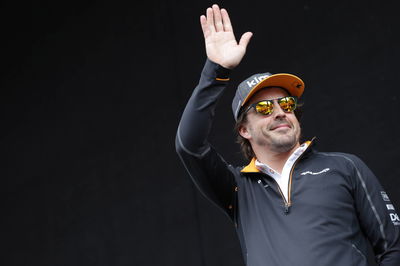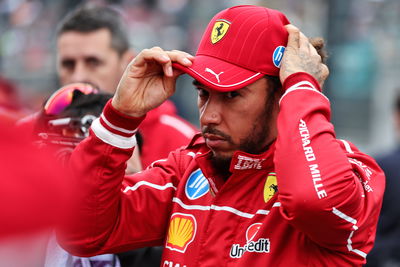Why we should stop feeling sorry for Fernando Alonso
As we enter the final few races of Fernando Alonso’s Formula 1 career, there is a strange mix of emotions throughout the paddock when it comes to his pending departure.
Some are glad to see the back of him, given the regular airing of complaints about the current state of F1. Others agree with Alonso’s diagnosis, going as far as saying that F1 has failed him by not being competitive enough to ensure that he is able to put his undeniable talent to good use and fight for wins and world championships.
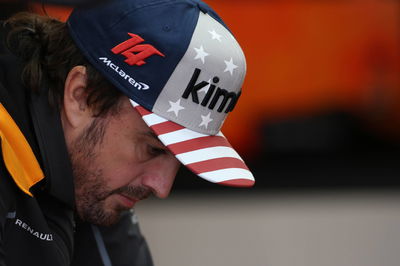
As we enter the final few races of Fernando Alonso’s Formula 1 career, there is a strange mix of emotions throughout the paddock when it comes to his pending departure.
Some are glad to see the back of him, given the regular airing of complaints about the current state of F1. Others agree with Alonso’s diagnosis, going as far as saying that F1 has failed him by not being competitive enough to ensure that he is able to put his undeniable talent to good use and fight for wins and world championships.
The latter theory was supported by his compatriot and 2019 McLaren replacement, Carlos Sainz Jr., last month in Mexico. “To not have one of the best drivers or the best driver in motorsport on the grid at the moment is a big loss,” Sainz said.
“So I think it is something for Formula 1 and everyone to consider, why one of the best drivers is leaving, and why we cannot have a bit more competitive grid where many drivers can fight for wins or for podiums.
“I think it’s a thing to consider and something to think about for the future.”
The lack of competition in F1 is a widely-recognised and discussed problem. Not since the start of 2013 has a team outside the ‘big three’ of Mercedes, Ferrari or Red Bull won a race. But the exit of Fernando Alonso should not be the wake-up call for F1 to try and fix that.
Frankly, we need to stop feeling sorry for Alonso. After all, he’s quitting on his own terms.
His reasons for leaving F1 are well-documented, the Spaniard citing soon after his announcement in August that he was uninspired by the current on-track action and state of the sport, prompting him to explore other interests such as sports car and Indy car racing. He isn’t leaving with feelings of regret. He claims he isn’t leaving because he was not able to get a competitive car, stressing for a long time that he could have secured a top F1 drive for 2019 if he wanted to stay.
Alonso has been saying this much since August, yet the same questions are being asked: is his departure proof that F1 has to change?
Growing tired of the repetitive nature of the line of questioning, Alonso finally snapped back on Thursday in Mexico when Sainz’s comments were put forward to him.
“I’m not stopping because I don’t have a competitive car. I’ve been saying the same thing from August,” Alonso exasperated.
“I’m stopping because I did everything I wanted in Formula 1. I arrived in Formula 1, I won grands prix in Formula 1, I won world championships in Formula 1, I break records in Formula 1. I drove for McLaren, for Renault, for Ferrari. I have 37 years, and I cannot do more in Formula 1.
"All the things that I dreamed of in Formula 1, are done. There are new things in motorsport that are bigger than Formula 1.
“From August, it’s the same thing: ‘It’s a shame, and Formula 1 should look that Fernando has to stop.’ I stop because I want to, not because I’ve been forced to stop. I want to stop because I achieved in Formula 1 more than what I dreamed of, and it’s time to achieve even bigger things outside of Formula 1.
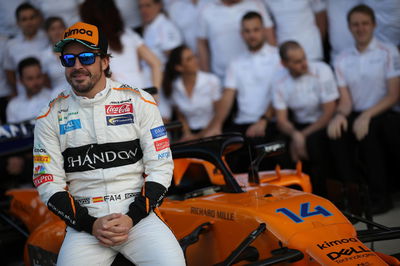
“In Formula 1, there is always the feeling that here is the biggest thing in the world, and if someone goes, people don’t understand that maybe he wants to go.”
Alonso has a point here. The reason his pursuit of the ‘triple crown of motorsport’ has been so surprising and such an exciting story to follow is because it is not normal nowadays. Drivers tend to stick to a single lane, especially when they are racing in F1, with very few daring to colour outside the lines and try their hand at something else.
There are numerous factors influencing this, such as concerns about the risk of injury (most infamously changing the career trajectory of Robert Kubica). But for the most part, as F1 is deemed to be the pinnacle of motorsport, why would anyone want to get their kicks racing elsewhere?
Alonso’s formation into a different kind of racer, one who doesn’t want to race solely in F1, may have been the result of his own decision-making. Had he been fighting for world championships for the past four years, which combined with greater success at Ferrari could have put him close to the kind of figures Lewis Hamilton is now boasting, then the likes of Le Mans and the Indy 500 may not have been so interesting.
As he said himself when the decision to race at Indy for the first time was made: “If I want to be the best driver in the world there are two options: I win eight Formula 1 World Championships, one more than Michael [Schumacher], which is very unlikely. The second one is to win different series in different moments of my career and be a driver that can race and win in any car, in any series.” Option one is not going to happen; option two therefore became the priority.
Legacy is an important thing for Alonso. He wants to be remembered. He does not simply want to fade out of the sport when the time does come for him to hang up his helmet for good. But deep respect is already something he feels from the F1 paddock.
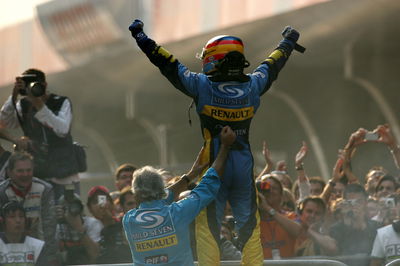
“I feel a lot of respect from all my career in Formula 1. By the team owners and team principals, I’ve been always respected and highly rated,” Allonso said.
“So I feel very privileged racing for those teams, having the respect from my teammates, the other drivers, you guys, the media, the fans. It has been perfect. Ot’s a perfect time to stop, and I feel perfect now.
“Again, when tomorrow or next week, [people say] it’s a sad thing that I’m leaving, when I had the respect from all the team principals, the teams, I raced for the best manufacturers, I’ve been paid a lot more than when I was in go-karts thinking what my salary in the future… I have a wonderful life, and I arrive to Mexico, and they give 30,000 faces to the grandstand to say bye-bye. In Abu Dhabi, it will be the same thing. I feel so privileged, I feel so happy, so respected around the world, that I can only say thank you.
“It has been a perfect journey, not a sad journey or a sad end.
“[But] I know that it doesn’t matter what I say, because it’s what the general opinion wants to think or wants to sell.”
Maybe Alonso is right. Maybe the narrative of F1 being in a bad place right now, with his departure being proof of that, is the better sell for some. It's more inflammatory to say that F1 has failed him.
But the truth is that F1 still has a number of extraordinarily good drivers fighting at the front of the pack. The title fights between Mercedes and Ferrari over the past two years have been brilliant. The rivalries enjoyed between Hamilton and Sebastian Vettel and, a few years back, Hamilton and Nico Rosberg, will be remembered very fondly. Like Alonso, they will all leave their own legacies, none of which will be dimmed by the current state of the sport.
A new chapter is opening for Alonso that could see him become just the second man in history to complete the triple crown of motorsport. That will leave a very different, yet more individual, legacy than what he could have achieved in the final few years of his F1 career.
So let’s stop feeling sorry for Alonso, and use his exit as a way to belittle F1 and say it failed him.
Instead, let’s recognise that this is a decision Alonso has taken all by himself, one that he says he is content with, and appreciate his final two appearances as a grand prix racer this month.
